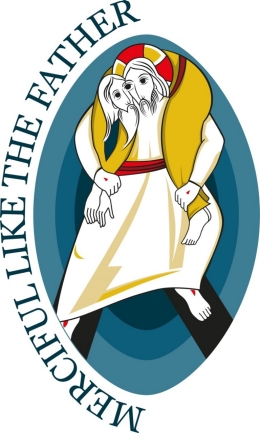
Many thanks to the SJT community for reflecting on the OLW “merciful.” Please join us; please share your insights. Thank you!
“Be merciful, just as your Father is merciful. ” (Luke 6:36)
and/or?
“So be perfect, just as your heavenly Father is perfect.” (Matt. 5:48)
Thanks to Pope Francis, the Catholic Church is sponsoring a Jubilee Year of Mercy from December 8, 2015 to November 20, 2016. All are invited–no exceptions.
In announcing this Jubilee, the Holy Father wrote beautifully about God’s Mercy and our need to respond to His Mercy. You can read his words here.
In response to the Jubilee, my OLW has been “mercy,” which, Providentially, we had explored as the SJT community last Fall. In retrospect, I see that writing about mercy and reading others’ posts on mercy was a wonderful preparation for the Jubilee.
Because we recently had reflected on “mercy,” I did not submit that word as my OLW–not that there are not always wider and deeper ways of reflecting on God’s Infinite Mercy. No. But I was not wanting to write a SJT post on “mercy” again.
Nevertheless, as we came to the end of our OLW schedule, Holly and Carol encouraged me to submit my OLW “mercy.” I proposed building on the “mercy” reflections we had done; I requested taking “mercy” a step further, in the form of the OLW “merciful.”
First, as an adjective, “merciful” speaks to me of being full of mercy. As a participle, “being merciful” speaks to me of putting into action, of demonstrating, of distributing that mercy of which one is full. In keeping with the Jubilee theme “[Be] Merciful like the Father,” I am grateful that Holly accepted to present this week’s OLW as “merciful.”

(The Mercy Jubilee logo (created by Jesuit Father Marko I. Rupnik), based on the Jubilee motto “Merciful Like the Father” (taken from the Gospel of Luke, 6:36) is found on the Vatican Jubilee website, specifically on this page, which contains a beautiful explanation of the Scriptural basis for the intricacies of the logo.)
For most of my spiritual journey, starting from my earliest years, I found the Scripture, “So be perfect, just as your heavenly Father is perfect” (Matt. 5:48) totally daunting. On the one hand, I felt the weight of the Lord’s command. I needed to be “perfect.” As an only child born to a super-perfectionist older father, I felt great paternal human pressure to be “perfect,” and so the Scriptural requirement seemed perfectly understandable–but none the less unachievable.
And yet, that unachievableness wasn’t just a lack of ability on my part to be the perfect child of my human father and my Heavenly Father. No, it was deeper, and led to a troubling contradiction that, in retrospect, I should have “called” the adults on. But I didn’t.
Knowing that I was a nervous, anxious child, my parents and teachers would tell me to stop trying to be perfect–just to do my best. Spiritual teachers would say that because we are “only human,” of course, we cannot be perfect. Only God is perfect. And the contradiction between “So be perfect, just as your heavenly Father is perfect,” on the one hand, and it is prideful to think that you can be perfect, on the other hand, definitely made my head spin. Why would God call me to a personhood I never could–or shouldn’t even be presumptuous enough to try to–attain?
And then it happened! At a particular noonday Mass in a Jesuit retreat house, the priest explained that the perfection we are called to in the verse “So be perfect, just as your heavenly Father is perfect” (Matt. 5:48), as revealed in the parallel discourse, is mercy: “Be merciful, just as your Father is merciful” (Luke 6:36). (Honestly, it never even occurred to me to compare or to juxtapose the Lord’s parallel discourse in Matt. 5:43-48 and Luke 6:31-36 in that way!)
To say I was relieved and jubilant is an understatement. The unattainable burden of trying to be perfect was lifted for me. Being merciful seemed a lot easier than being perfect–even if the priest said that the terms were interchangeable in that parallel Scripture context.
In the years since I first heard those words, I have done much reading about God’s Mercy, particularly once I became introduced to the Divine Mercy Devotion. Most recently, I have been reflecting on the Holy Father’s Jubilee announcement. I realize how naive I was to think that being Merciful like the Father is easier than being perfect. But still, for whatever reason, my comfort in that thought continues.
In this Jubilee, the Holy Father has encouraged us to be merciful like the Father by performing corporal and spiritual works of mercy, as he details in his Jubilee “Bull of Indiction”: Misericordiae Vultus (Face of Mercy), [#15, internal paragraphing and itemizing, mine]:
“It is my burning desire that, during this Jubilee, the Christian people may reflect on the corporal and spiritual works of mercy. It will be a way to reawaken our conscience, too often grown dull in the face of poverty.
“And let us enter more deeply into the heart of the Gospel where the poor have a special experience of God’s mercy. Jesus introduces us to these works of mercy in his preaching so that we can know whether or not we are living as his disciples.
“Let us rediscover these corporal works of mercy:
- to feed the hungry,
- give drink to the thirsty,
- clothe the naked,
- welcome the stranger,
- heal the sick,
- visit the imprisoned, and
- bury the dead.
“And let us not forget the spiritual works of mercy:
- to counsel the doubtful,
- instruct the ignorant,
- admonish sinners,
- comfort the afflicted,
- forgive offences,
- bear patiently those who do us ill, and
- pray for the living and the dead.”
For me, the hardest work of mercy is to forgive others, even though I continue to pray: “Forgive [me my} trespasses as [I] forgive others their trespasses against [me].” Scary.
“You have heard that it was said, ‘You shall love your neighbor and hate your enemy.’ But I say to you, love your enemies, and pray for those who persecute you, that you may be children of your heavenly Father, for he makes his sun rise on the bad and the good, and causes rain to fall on the just and the unjust. For if you love those who love you, what recompense will you have? Do not the tax collectors do the same? And if you greet your brothers only, what is unusual about that? Do not the pagans do the same? So be perfect, just as your heavenly Father is perfect.” (Matt. 5:43-48)
For He makes the sun (His sun) to shine on the good and bad and the rain to fall on the just and the unjust; whereas, if it were up to me, I would deny the sun to the “bad” and rain to the “unjust,” condemning myself, because I, too, am “bad” and “unjust.”
As the Holy Father points out (#9): “Jesus affirms that mercy is not only an action of the Father, it becomes a criterion for ascertaining who his true children are. In short, we are called to show mercy because mercy has first been shown to us. Pardoning offences [sic] becomes the clearest expression of merciful love, and for us Christians it is an imperative from which we cannot excuse ourselves.”
Thank God for His Mercy, which embraces us first in His forgiveness so that we can be merciful to others. I could write much more about my response (or lack thereof) to the call to be merciful every day of my life.
For now, I will end, knowing that there is no end to God’s mercy, no end to my need for that mercy, and hardly a beginning to my being truly merciful as my Heavenly Father is Merciful.
Merciful like the Father…those are Infinitely BIG SHOES to fill. I take heart that when I was little, I would dance with my human father by standing on his shoes, and I would move along with him. Maybe that’s what I need to do now–to ask the Lord Jesus, Who the Holy Father says is “the face of the Father’s mercy,” to dance me–to lead me–into being merciful like our Heavenly Father.
Thank you for considering and responding to my O[BIG]LW: merciful.
May God lead us all to become “perfectly” merciful!
p.s. Here is one of my favorite quotes from the Pope’s Jubilee message: “With our eyes fixed on Jesus and his merciful gaze, we experience the love of the Most Holy Trinity.” (#8)
Here, too, are a couple of my favorite “merciful” Scripture quotes:
“The Lord is gracious and merciful, slow to anger and abounding in mercy.” (Psalm 145:8)
“The Lord is just in all His ways, merciful in all His works.” (Psalm 145:17)
“Blessed are the merciful, for they will be shown mercy.” (Matt. 5:7)
“But the tax collector stood off at a distance and would not even raise his eyes to heaven but beat his breast and prayed, ‘O God, be merciful to me, a sinner.’” (Luke 18:13)
And, “of course”:
“Be merciful, just as your Father is merciful. Stop judging and you will not be judged. Do not condemn, and you will not be condemned. Forgive, and you will be forgiven.” (Luke 6:36-37)


I can tell you’ve given this a lot of thought and reflection, Bobbie. Mercy/ being merciful is indeed a big one-little-word, but the picture you leave us with, of you standing on your father’s shoes while he leads you in the dance is what I find ever so meaningful. May we all dance with our heavenly Father that way – to the tune of mercy, or love, or hope, or patience or any of the graces He leads us in.
LikeLike
🙂 Amen! Thank you so very much for reading and affirming that remembrance. So glad it resonated with you! Funny how the Lord (in this case unexpectedly!) brings to mind some things from our past to provide transfer-images to lead us closer to Him. I like the way you broadened the dance to include other steps and rhythms! Thank you for giving my OLW extended meaning. God bless you!
LikeLiked by 1 person
Like Violet, I loved this image:” I take heart that when I was little, I would dance with my human father by standing on his shoes, and I would move along with him. Maybe that’s what I need to do now–to ask the Lord Jesus, Who the Holy Father says is ‘the face of the Father’s mercy,’ to dance me–to lead me–into being merciful like our Heavenly Father.” I’m glad we were able to explore this word with you. It’s such a beautiful word and concept – especially when it is put into practice! Those Luke verses are ones to put everywhere where we can see them!!
LikeLike
Thank you for sharing my OLW and for taking time to read and to comment on the image that struck you. God bless you; you are most merciful like the Father!
LikeLike